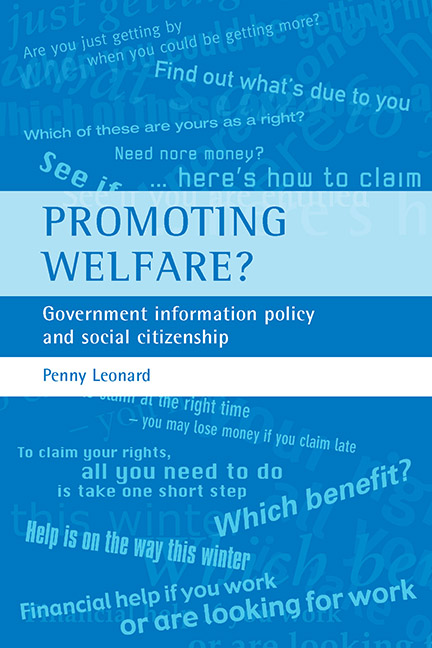Book contents
- Frontmatter
- Contents
- Foreword
- Preface
- List of abbreviations
- one Introduction
- two Citizenship
- three Information
- four Social democracy and information
- five The New Right and information
- six New Labour and information
- seven Case study A: In-work benefits for low wage earners
- eight Case study B: Means-tested benefits for older people
- nine Information for citizenship?
- References
- Appendix A Government expenditure on publicity for social security benefits (1973-98/99)
- Appendix B Sample leaflets and posters
- Index
- Also available from The Policy Press
Preface
Published online by Cambridge University Press: 20 January 2022
- Frontmatter
- Contents
- Foreword
- Preface
- List of abbreviations
- one Introduction
- two Citizenship
- three Information
- four Social democracy and information
- five The New Right and information
- six New Labour and information
- seven Case study A: In-work benefits for low wage earners
- eight Case study B: Means-tested benefits for older people
- nine Information for citizenship?
- References
- Appendix A Government expenditure on publicity for social security benefits (1973-98/99)
- Appendix B Sample leaflets and posters
- Index
- Also available from The Policy Press
Summary
The original idea for this book can be traced back to the many years I spent working in an information and advice agency. Every day, people were seeking information and on every conceivable topic: some knew exactly what they were looking for while others were unsure what there was to know, or unaware that information could be helpful to them at that time.
Although there appears to be a wealth of public information, it is evident on closer inspection that some government departments and agencies are keener than others to tell the public of available services. In addition, public information about the services that are provided may not be consistent within a department. It is also evident that information designed for the public comes in a variety of forms. For example, leaflets can be bright, well-designed and eye-catching to encourage the reader; but they can also be dull and dreary with closely printed text that makes any reader feel weary before beginning. On some subjects there is no easily available information. Consequently, many people do not have easy access to information about services and benefits to which they are entitled, and how they might qualify for them. Research over many years has shown consistently that it is this ignorance that prevents many people from claiming their entitlements.
This book explores the ways in which governments promote welfare and inform the public of their social rights as citizens. In doing so, it aims to redress the balance in research which has often concentrated on individual reasons for not claiming entitlements. The main purpose of the book is to use government information policy to analyse attitudes to citizenship.
The research was undertaken between 1997 and 2000. In order to understand how decisions about information provision were taken, I conducted a number of interviews with both current and retired policy makers. These were politicians with a particular interest or experience in the subject and senior government officials directly involved in information policy. Officers of both voluntary organisations and local authorities with relevant experience and knowledge were also interviewed. Their views give a valuable balance and alternative perspective to the ‘official’ line. I am grateful to them all for agreeing to talk to me about their work. Their interest in the subject matter of this book confirmed my belief that this was a worthwhile project.
- Type
- Chapter
- Information
- Promoting Welfare?Government Information Policy and Social Citizenship, pp. ixPublisher: Bristol University PressPrint publication year: 2003



